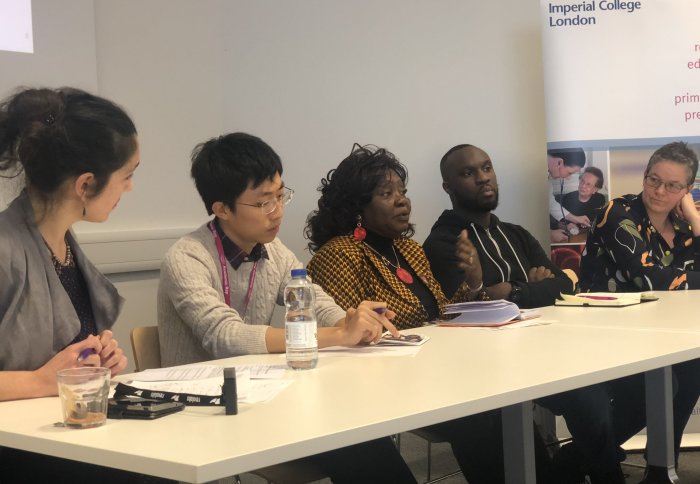Global Health students and London voluntary sector share community expertise

Year 4 undergraduates in the College's BSc Global Health degree took part in a showcase event at the Invention Rooms with voluntary sector partners.
The afternoon was spent at the College's Invention Rooms at the White City campus, a unique space where the local community and Imperial come together to collaborate, innovate and make.
As part of their fourth year of studies undergraduates from the School of Public Health take part in a social accountability and community engagement initiative. Beginning as a pilot in 2018/19, this part of the BSc Global Health degree now has a far greater focus on the social benefits of strong communities, in addition to targeting disease prevention.
Each year groups of students produce and present reports alongside their community partners which will inform the next year's student cohort. Some 27 students took part in the project in 2019/20, working alongside 10 different community groups to understand local health inequalities and effect strategies to reduce disparities in people's health and wellbeing.
This year students partnered with Disability Advice Service Lambeth, Forward UK, Addison Community Champions, One Westminster, Young Brent Foundation, Young Hammersmith & Fulham Foundation, Hammersmith Community Gardens Association, Myatt’s Fields Park Project, The Abbey Centre, and Baraka Youth Association.
Changing the focus

Dr Mariam Sbaiti, Senior Teaching Fellow in the School of Public Health, said: "We're here today to celebrate the many benefits of working together and learning from one another. This project is a key part of the School's response to the College's Learning & Teaching Strategy. At its heart is more effective and enjoyable education.
"Our new curriculum introduces opportunities for dialogue between our students and the local community. We know that after years of acute austerity voluntary sector organisations are having to work even harder to bring about change."
One student group were placed with the Hammersmith Community Gardens Association (HCGA) for the Community Group Placement module. The students found that primary care services are facing increasing pressures and cannot address the complex health needs of populations in Hammersmith. They focused on the local population (school children participating in the educational initiatives of HCGA and socially disadvantaged adults with long-term unemployment or mental health) within the Wormholt and White City ward, an area of North West London facing widespread deprivation.
"This is an area of medicine which requires thoughtful teaching permeating into medical school curriculums." Amelia Kataria Golestaneh Undergraduate student
Amelia Kataria Golestaneh, a medical student from University of Liverpool, and an intercalating BSc Global Health student at Imperial, said: "This is an area of medicine which requires thoughtful teaching permeating into medical school curriculums, reimagining of how we perceive ‘hard to reach’ populations, and a concerted effort as a multidisciplinary health team is more important than ever."
Ray Wang, a medical student from the College, was placed at Addison Community Champions, a small, volunteer-dependent project serving a disadvantaged community.
Ray recommended low cost solutions focussed around measuring and enhancing volunteer development, alongside gathering ideas for better engagement around men’s wellbeing, a local priority. Ray said: "I gained a deeper understanding of how very small actions on a grassroots level – whether community outings or coffee mornings - can make a meaningful impact on people’s wellbeing."

Debating the value of medicine in the community
The main goal of the afternoon was to explore some of the challenges experienced by the voluntary sector, as well as the insights of Imperial students. Community partners, Dr Sbaiti, and students debated with each other on a series of panels. The first panel focused on the theme of working with specific groups within communities.

Yvette Robbin-Coker, Training & Development Coordinator of Forward UK, said: "There’s a need to reduce the gap between professionals and the community. The professionals don't often understand the community, and the community often don't understand the professionals. The more each understands the expertise and knowledge of the other, the more empowered we will all become.”
Undergraduate student, Ray Wang, provided the perspective of his cohort and agreed Ms Robbin-Coker: "We have to actually ask service-users what they want when they walk into a GP surgery, hospital or community centre.
"Alongside their basic request for help, they’re also exercising their rights as a citizen. They should feel listened to and should feel ownership and involvement in what is being provided.”
The second panel consisted of supporting healthy lifestyles in the community.
"We have to actually ask service-users what they want when they walk into a GP surgery, hospital or community centre." Ray Wang Undergraduate
Katie Shaw, Operations Manager of Hammersmith Community Gardens Association, said: “We always tell people we’re an environmental charity but actually we’re about people and education. Many of our users have poor mental health or are unemployed.”
Ray Wang highlighted the stresses and strains he's noted during his four years of his degree: “It’s all very well for me in a GP surgery to decide to send patients to community services in significant numbers, alleviating the strains on the health service. The problem is that the funding is so insufficient. There’s a lot of challenges and opportunities in this area.”
Article text (excluding photos or graphics) © Imperial College London.
Photos and graphics subject to third party copyright used with permission or © Imperial College London.
Reporter
Murray MacKay
Communications Division